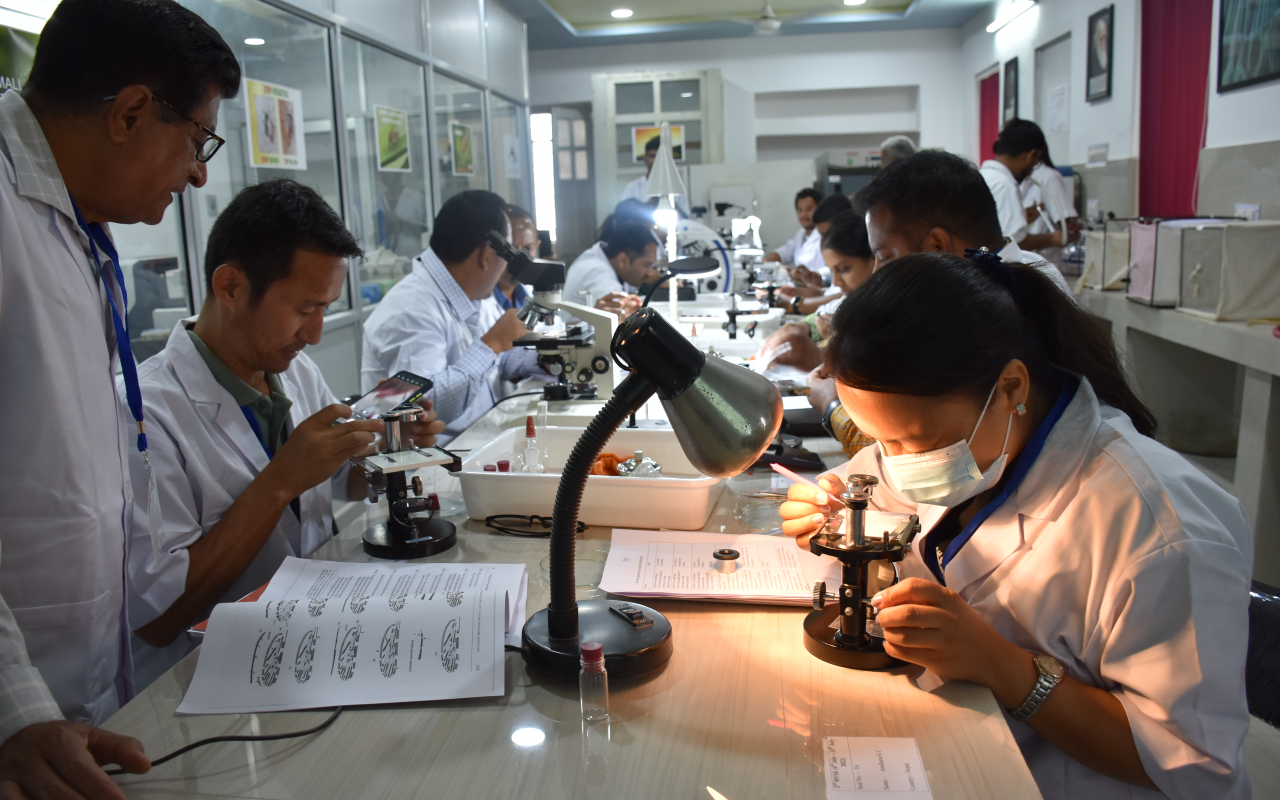
The Asia-Pacific Malaria Elimination Network (APMEN) is mandated to provide support for the malaria elimination objectives of its 21 Member States across the Asia-Pacific Region. APMEN does so by way of close collaboration with the Asia-Pacific Leaders Malaria Alliance (APLMA) for higher-level advocacy, promoting networking and country interaction, facilitating meetings and exchanges, while APMEN also provides technical support via its three Working Groups, these being the APMEN Surveillance & Response WG, APMEN Vector Control WG, and APMEN Vivax WG.
The APMEN Vector Control Working Group (VCWG) in recent years has focused on providing support for vector surveillance capacity building, as this is a skills-set that surveys within National Malaria Control Programmes have shown to have significant shortfalls and such NMCP’s have requested capacity-strengthening support. The APMEN VCWG provides such capacity strengthening through enabling selected participants to attend specialized courses such as the Diploma in Applied Parasitology & Entomology; regular webinars on topics related to vector surveillance & control; short online courses such as GIS, Strategic Planning, and Insecticide Susceptibility Course; a dedicated website as repository of information and for networking (https://orene.org/); and intensive two-week face-to-face courses on Malaria Vector Surveillance for Elimination (MVSE). Two previous MVSE courses have been held, the first one in 2018 in Kuala Lumpur hosted by the Institute for Medical Research, the second one in Bangkok hosted by Kasetsart University, and the two courses were attended by between 20-32 participants invited from across the Asia-Pacific Region.
For the 3rd MVSE course, APMEN decided to adopt a more Regional approach, starting with South Asia, with the intent to rotate the course to other regions in subsequent years. Because India has the highest malaria burden in South Asia, contributing 83% of all malaria cases in the WHO SEAsia Region, APMEN recommended that this would be an appropriate country to host the course within the South Asia target area. As early as first-quarter 2020, through a consultative process we selected the University of Tamil Nadu as host, but the emergence of the Covid-19 pandemic prevented the course from proceeding in both 2020 and 2021. As the pandemic receded and travel restrictions were lifted, it became possible to schedule the course for July 2022, but the University of Tamil Nadu remained unavailable due to continuing Covid-19 limitations and we moved the venue to the second option, the Mohanlal Sukhadia University in Udaipur, Rajasthan. Host institutions were selected based on presence of appropriate infrastructure such as lecture theatres, Insectaries with multiple mosquito colonies, laboratories equipped with enough stereo and compound microscopes for at least 20 students, nearby accommodation for participants, experience in hosting groups of visiting students, plus availability of a core of skilled entomologists with strong experience in vector surveillance.
We advertised the opportunity for nominees using the APMEN contact list, to invite Country NMCP’s and Partner Institutions to apply for participation in the course. Because of limited budget, the number of available slots was limited to 20 participants, and a selection process was based on prioritizing younger-generation field-level entomologists, with due regard to gender equality. Countries eligible were Afghanistan, Bangladesh, Bhutan, India, Nepal, Pakistan and Sri Lanka. Preferential opportunity was granted to India because of its disproportionate burden of malaria, and it was allocated 10 slots out of the 20. In the end, Afghanistan and Pakistan applicants were not able to obtain visas for India, despite significant efforts to support their applications.
The course was held from 3 to 15 July 2022, hosted within the Laboratory of Public Health Entomology in the Department of Zoology, Mohanlal Sukhadia University, Udaipur, Rajasthan, India. The Head of Department is Professor Arti Prasad, who administered and led the course with competence and kind hospitality. Professor Prasad made available her entire post-graduate complement of 18 students to provide logistical and general support in ensuring all facilities and arrangements were timeously available, and ensured that accommodation, meals and transport was professionally provided.
The training was provided by a mix of 14 national and international experts, listed in the text below. The course covered a broad range of topics under the umbrella of Vector Surveillance, including the following:
- Initial introductory presentations on global malaria situation (Dr Elkhan Gasimov), the malaria elimination programme in India (Dr Roop Kumari and Dr Rinku Sharma), global arbovirus situation (Dr Rajpal Yadav), malaria vectors, species complexes and groups in Asia-Pacific (Dr Sylvie Manguin), how Sri Lanka achieved malaria elimination and is dealing with potential re-invasion (Dr Risintha Premaratne)
- Design and development of a malaria vector surveillance programme (one whole day) (Prof Neil Lobo)
- Developing a Work-Plan for vector surveillance (Dr RS Sharma)
- Mosquito morphology and systematics (Mr PT Joshi)
- Dengue vectors and vector biology (Dr RS Sharma)
- Mosquito sample collection, processing, data recording and storage (Mr PT Joshi)
- Use of dichotomous keys for mosquito identification (two days) (Dr Asokan)
- WHO Insecticide Resistance Monitoring assay procedures (Dr Rajpal Yadav, Dr Ashok Kumar, Mr Pradeep Jangir)
- Insectary maintenance and procedures (Mr PT Joshi, Dr Ashok Kumar)
- Insecticide modes of action and efficacy testing (Dr Manas Sarkar)
- PCR and ELISA techniques (Dr Himmat Singh)
The course included a two-day Field Trip for exposure to different trapping techniques and vector surveys, which was done in the Banswara region. The course is considered to have been a success and provided valuable training and practical experience to 20 participants from the South Asia region.
